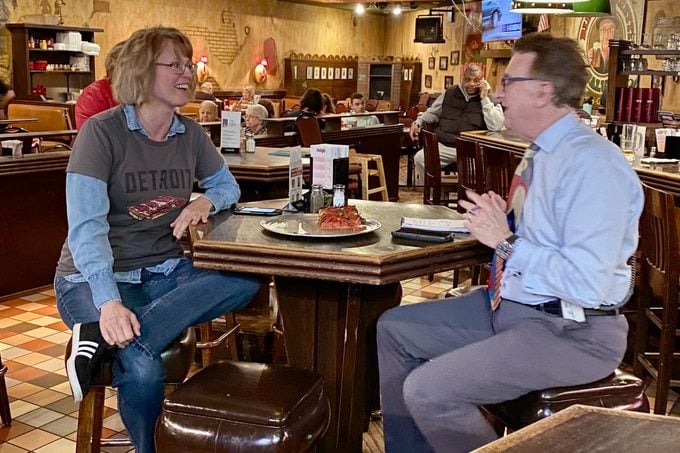I’m an Introvert Who Challenged Myself to Connect with Strangers, and I’ve Never Been Happier
Updated: Dec. 05, 2023

Talk with strangers, and you could reduce stress and boost wellness while making yourself happier overall
Ever get the feeling you’re your own worst enemy? That’s how I felt when I saw a Facebook acquaintance inviting people to join her newly organized book club. Normally, I’d close the app—I’m not the sort to talk with strangers, even over a shared love of reading. Instead, in a burst of optimism, I sent her a message and agreed to show up.
Fast-forward to the night of the book club, which found me parked outside a perfect stranger’s house with my worn copy of Ernest Hemingway in hand. I didn’t want to get out of the car. My positive attitude had fled, and that night, I was absolutely certain I’d be much happier at home. Why had I agreed to hang out with people I had never met before?
Blame it on science: I knew from a bevy of experts and lots of podcasts that connecting with strangers and finding a community would make me happier. At least, I was sure it would once I got out of the car.
Get Reader’s Digest’s Read Up newsletter for more life tips, humor, cleaning, travel, tech and fun facts all week long.
Finding a new circle
The world is full of successful extroverts: presidents, queens, sports heroes and talk-show hosts like Oprah. Me? I’ve always compared myself to Dr. Jekyll and Mr. Hyde: I’m an introvert who has tried since my teenage years to become the life of the party. Or, at least, pretend to be.
Since my children are nearly grown and flown, and I’m approaching the second half of my life with fewer friends than I wanted, I knew I had to make a change. Rather than giving in to my hermit ways, I decided to set a goal: learn what it takes to become more extroverted.
In other words, I had to do the thing I dreaded the most. I had to talk with strangers.
It turns out that science and research back up my plan. Talking to strangers promotes well-being, a sense of community and the idea that you belong. Having a conversation with someone you don’t know doesn’t seem like it would improve your life, but those first awkward steps can result in relationships that feed your soul in surprising ways.
Born an introvert
Some people are extroverts. They surround themselves with friends, gain energy from being in crowds and love small talk. These are the kinds of people I have always sought out as my closest friends—that way, I can go along for the ride without having to do the hard work myself.
I have always been the “quiet one,” the girl in the glasses, the bookworm people liked to tell to “smile more.” I must have a resting expression that makes me look grumpy, so I get it.
Even at a young age, I knew socializing didn’t come easily to me. Rather than sit on the sidelines forever, I forced myself to join the high-school newspaper. This required me to talk to classmates, interview teachers and edit my co-workers. It worked: I ended up going into journalism, a rewarding career that I love still today.
But I also started writing local history books on the side—giving into my desire to hide in libraries, do long-term research in archives and isolate myself in my home office for months at a time. When these projects are done and I finally look up, I find few invitations to parties and rarely anyone calling to see whether I’m free for lunch.
I’m not alone, in some ways. Many people are feeling isolated because of life changes, aging and remote work. Americans are struggling with connection, an issue made worse through the use of texting or smartphones as our main methods of communication. We want to connect, but we don’t know how.
Project “Talk with Strangers”

To fight the creeping isolation, I put my research skills to the task. I started listening to podcasts like The Happiness Lab, hosted by Yale University’s Dr. Laurie Santos, and the Dr. John Delony Show, both focusing on relationships.
The podcasters agree: Introverts might think they feel better when they’re alone, but the opposite is true. Facing those awkward moments when you talk with strangers is good for you. In fact, Dr. Santos notes that sharing a common experience intensifies its pleasure, making even a simple walk or wasting time in a store checkout line more enjoyable.
Another one of my favorite experts, productivity guru Cal Newport, even includes community as one of his core tenets for a deep life. Rather than encourage people to work 24/7, Newport promotes friendships, relationships and community volunteerism as ways to enhance your life.
Writer Arthur C. Brooks, who studies happiness as a profession through his “How to Build a Life” column in the Atlantic, also convinced me that reaching out to a new group of people or chatting up the bank teller might be better for me than I’d imagined. Turning everyday interactions into regular habits means we can create meaning in our relationships, both in the short term and over the course of our life, Brooks notes.
“The happiest people have lives focused on love: of family, of friends, of others through work that serves. … Research on people who wind up happy (and healthy) as they grow old shows that the most important part of life to cultivate is a series of stable, long-term love relationships,” Brooks wrote in his 100th column.
Harvard Medical School professor of psychiatry Robert Waldinger, co-author of the inspirational book The Good Life: Lessons from the World’s Longest Scientific Study of Happiness, concurs. In interviews, Dr. Waldinger says the people who are healthiest and happiest pay attention to relationships throughout their lives. Isolation creates stress, and stress can make you feel unwell. Moreover, even the smallest interactions with a barista or grocery cashier can offset that stress and bring equilibrium.
Thanks to the experts, I finally got it. I knew how to talk with strangers. Now, I just had to find people to harass—I mean, forge bonds with—for my experiment to work. I wasn’t necessarily looking forward to it.
Learning to roll with it
Remember that book club? It turns out, it included some lovely women from a variety of backgrounds, including math professors, a sculptor, a lawyer and more. Everyone brought a portion of an overflowing charcuterie board, so we ate and talked about the Jazz Age for hours.
Was it always comfortable? Absolutely not. But did I feel like I made new friends that I’m looking forward to seeing next month? Yes, definitely. The get-together held true moments of joy, and I even got a hug from one member when we bonded over our mutual love of acupuncture for our aching joints.
Maybe every encounter with a stranger won’t turn out this way. But I’m willing to try each and every time. Finding commonalities with people who cross my path is more fun than I realized, and I look forward to meeting more potential friends. Life is a gamble, and I’m ready to bet that my risk will be well rewarded.
You know what they say: Nothing ventured, nothing gained.
Sources:
- The Happiness Lab
- The Dr. John Delony Show
- The Atlantic: “How to Build a Life”
- The Good Life: Lessons from the World’s Longest Scientific Study of Happiness

















